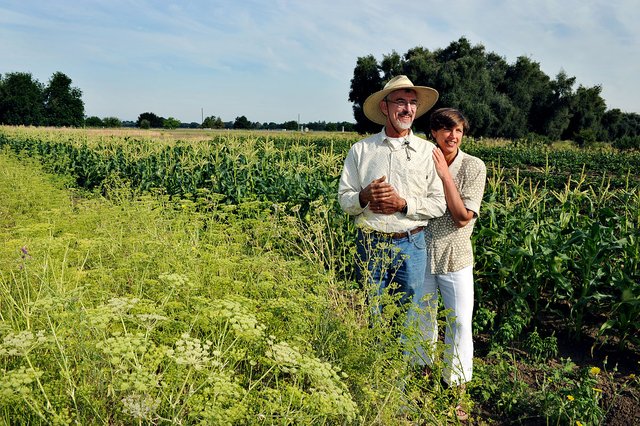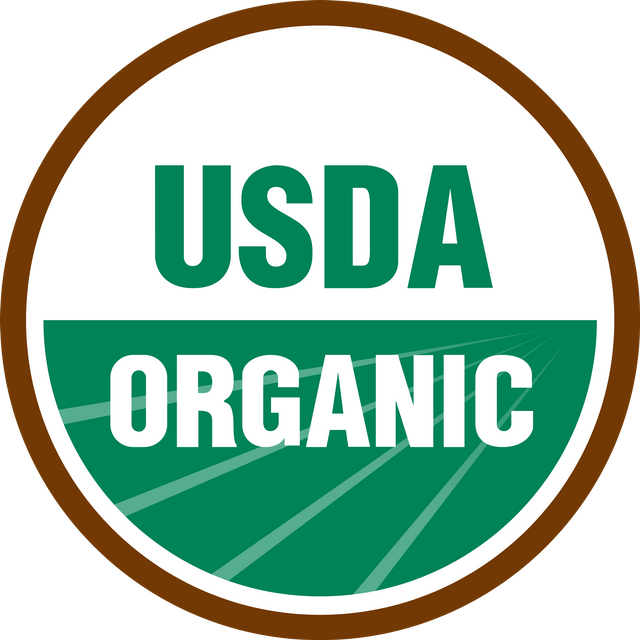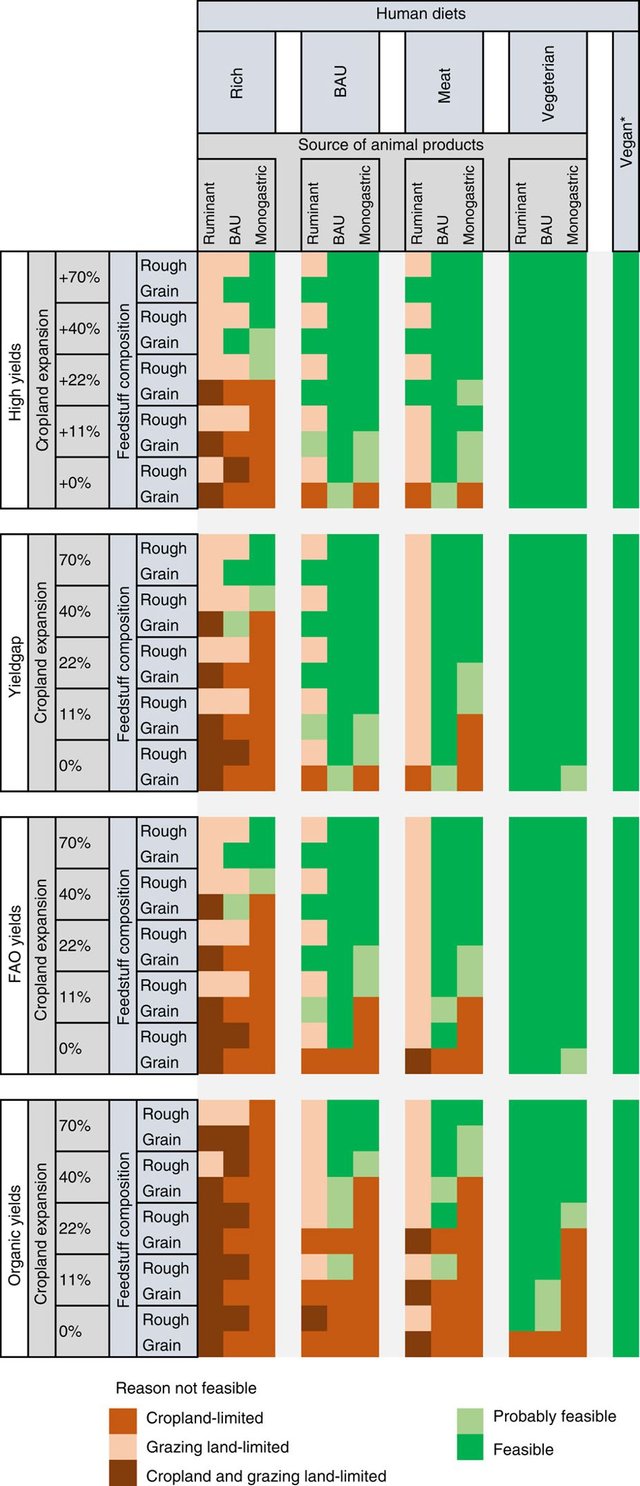Are 'organic' Foods better for you and for the environment?
I have been reading about food and agriculture lately and I was surprised by some of the misconceptions about organic foods. Some say it is definitely healthier, more nutritious and better for the environment. But is all of this true? I was intrigued by that question and decided to do some further searching.

Farmer Pamela and Raoul happily standing on their UC Davis certified organic farm. Photo credit Pico van Houtryve, picophotos.jpg
What are organic foods
The term 'organic' is a label, mostly governed by a higher authority, that food producers are allowed to use for marketing their product when the production complies with certain regulations.

USDA organic label (Public Domain)
The goal of this is for more environmentally friendly agriculture with a more socially and economically sustainable production. This makes organic farmers rely on more natural measures of increasing efficiency such as crop rotation, hand weeding and animal or plant manures.
Composite foods can also be labeled as organic when they contain at least 95% organic ingredients and no artificial colorings or flavorings.
Environmental perspective
At first it seems like a great idea. No pesticides and chemical fertilizers are with no doubt better for the surrounding nature. High nutrient runoff causes eutrofication which is deadly for certain species and biodiversity, and the same is true for reckless pesticide use. Environmental degradation and degradation of several ecosystem services is often a result of intensive farming practices.
But there is only one aspect that often gets forgotten in this equation. Pesticides and fertilizers work. Traditional farming is about 13 - 25% more efficient than organic farming and thus also requires 20% less land for producing the same amount of produce. Meaning that this land could have been used for other valuable ecosystem services in stead. But despite the lower yields, organic farming is more profitable (about 25%) since consumers are willing to pay more for the goods.
There is a very interesting research that appeared in Nature where they assessed the probability of successfully feeding the world population with certain production and consumption scenarios. It appears that a fully organic agricultural sector is only feasible if the world switched to a vegan diet. Any other circumstance and would have to expand our cultivated land or change our diets.

Fascinating figure illustrating feasibility of agricultural practices under certain global consumption patterns. Image from the original research (Erb, et al., 2016)
So should we switch to organic farming for a ecologically sustainable food production? As how see it no.
Health perspective
At least we can expect organic food to be more nutritious and contain less herbicides and chemicals I suppose? The answer may surprise you! Quickly continue to the next paragraph to learn more!
Although it is often marketed otherwise, organic foods are not more nutritious compared to their conventional counterpart. Multiple studies analyzed the content of micro- and macronutrients but no consistent, significant difference arose.
A second argument often used to promote organic is the fact that little to no pesticides and herbicides can be found on your food and this actually is true. Your organic apple has slightly less traces of pesticides, but the amounts for both the organic apple and the conventional apple fall far between the level of safe consumption. The only thing that matters then is, do you believe in a safe level of consumption?
Conclusion
Of course organic farming is not all bad. It offers many more jobs compared to traditional farming and the quality of the soil increases when no pesticides or herbicides are used. It surely restores the image of a farm being a kind place surrounded by nature where people live together with the crops and livestock for producing the beautiful apple that you will enjoy eating. But we must realize that this 'ideal' won't feed the 9 billion of tomorrow.
So will organic farming be a way for a healthy ecological life? I'm not so sure of that.
What is? I believe we must focus on better usage of pesti/herbicides, changing our never ending appetite of red meat, close the yield gap (Difference in potential yield vs actual yield in developing countries) and embracing the good that can be done with careful GMO usage.
Of course this is my interpretation of the facts. If you want to share your opinion, I'd love to hear it!
Sources
https://www.gov.uk/guidance/organic-food-labelling-rules
https://www.bbcgoodfood.com/howto/guide/organic
Erb, K., Lauk, C., Kastner, T., Mayer, A., Theurl, M. C., & Haberl, H., et al. (2016). Exploring the biophysical option space for feeding the world without deforestation. Nature Communications 64(2) https://doi.org/10.1038/ncomms11382
https://www.health.harvard.edu/staying-healthy/should-you-go-organic
Smith-Spangler C, Brandeau ML, Hunter GE, Bavinger JC, Pearson M, Eschbach PJ, et al. Are Organic Foods Safer or Healthier Than Conventional Alternatives?: A Systematic Review. Ann Intern Med. ;157:348–366. doi: 10.7326/0003-4819-157-5-201209040-00007
check this study https://www.mayoclinic.org/healthy-lifestyle/nutrition-and-healthy-eating/in-depth/organic-food/art-20043880
Interesting study nonetheless, but that link also points out that there is still limited information to assess the overall health benefits of organic food. Further more it lists 'potential' health benefits. Also does it not point out the ecological aspect of organic farms but solely focuses on the health-part of the story.
So although interesting, I think it lacks some broader perspective 🍎
The ecological aspects of organic farming speak for themselves, no chemical runoffs flowing into lakes , rivers and oceans causing toxic algae spills for example. https://www.washingtonpost.com/national/health-science/report-polluted-farm-runoff-linked-to-toxic-green-algae-slime-in-us-waters/2013/09/26/591a75a2-25f1-11e3-b75d-5b7f66349852_story.html?noredirect=on&utm_term=.6f26226b4908
Organic farming indeed reduces the amount of nutrient runoff, there is no doubt about that. But then the question is, do we want to deal with periodical algae blooms, or sacrificing additional land as large as Mexico in order to produce the same amount of food?
There are already many initiatives and techniques to reduce runoff as much as possible, while increasing organic productivity to the same level won't be achieved in the near future with the techniques we have today (Especially when we keep blocking GMO's). So Better education and usage of chemicals seems like a better alternative for a long term sustainable solution. But that's my opinion.
Experimentally, conclusions haven't been made on this, but in my country people prefer organic food. This is their general opinion.
As for myself, I don't know, studies on this topic aren't really that certain. Each have their benefits and disadvantages. I think it'll be best, even if it is by adopting both practices to maximize economic profit, environmental sustainability, good human diet and any other merit.
I'm sure a little linear programming would do. Nothing hard for our science.
I surely think that the need of alternative methods in organic farming can be a great driver for innovation. And conventional farms surely can learn a thing or two from these practices. So in that case a bit of both indeed seems like a great idea. But maybe it is important to inform the broader public of the other side of organic foods. 🌱
Hi @samve!
Your post was upvoted by @steem-ua, new Steem dApp, using UserAuthority for algorithmic post curation!
Your UA account score is currently 2.443 which ranks you at #16663 across all Steem accounts.
Your rank has dropped 3 places in the last three days (old rank 16660).
In our last Algorithmic Curation Round, consisting of 236 contributions, your post is ranked at #152.
Evaluation of your UA score:
Feel free to join our @steem-ua Discord server
This post has been voted on by the steemstem curation team and voting trail.
There is more to SteemSTEM than just writing posts, check here for some more tips on being a community member. You can also join our discord here to get to know the rest of the community!
To the question in your title, my Magic 8-Ball says:
Hi! I'm a bot, and this answer was posted automatically. Check this post out for more information.
It is actually funny your Magic 8-Ball says that! Perhaps you are right. I should review my entire article... 🙊
Hi there!
I think you missed a link somewhere here ..
Thanks! was supposed to be some sort of pun but indeed causes more confusion. Changed it up a bit ;)
Congratulations @samve! You have completed the following achievement on the Steem blockchain and have been rewarded with new badge(s) :
Click on the badge to view your Board of Honor.
If you no longer want to receive notifications, reply to this comment with the word
STOPDo not miss the last post from @steemitboard:
Hi @samve!
Your post was upvoted by utopian.io in cooperation with steemstem - supporting knowledge, innovation and technological advancement on the Steem Blockchain.
Contribute to Open Source with utopian.io
Learn how to contribute on our website and join the new open source economy.
Want to chat? Join the Utopian Community on Discord https://discord.gg/h52nFrV
I was surprised to read the word organic in " " and your conclusion in the end of this article promoting in one sentence GMO usage. There are controversial findings concerning the use of GMO and the effects on health. In Europe they are labelled. Concerning the health benefits of organic food, you will find studies testifying this at pubmed. Organic meat has some rules concerning the use of antibiotics in animals too. This is so important if you take into account the big problem with bacteria tolerance to antibiotics right now.
I know GMO's are controversial, and that research is not all that conclusive. But the possible advantages cannot be ignored. And of course, It is not just one GMO that is controversial. GMO's come in a wide variety of shapes and grades of modification. I don't think we should ban all GMO's, and experimenting with the technology should not be such a taboo as it is now.
Antibiotics are something that shouldn't be used recklessly indeed, but you don't have to switch to organic for that. the 'organic' label limits farmers to more than just the use of antibiotics. But meat in general is such a burden on the ecosystem. I'm especially fond of the graph with the different scenario's. Just switching to a vegetarian diet would make it so that we won't have to expand our farmlands. 🍇
I cannot match all organic regulations even I plant vegetable myself . I can avoid pesticides, GMO's feed but still use chemical fertilizers. Avoiding chemical fertilizers is my goal to achieve for my organic vegetable.I know chemical fertilizers is not good for environment but I don't think it is harmful to vegetable. Organic farming requires many physical labor to people but it's OK to me. Because I plant vegetable just for my family and it doesn't need to plant a lot of vegetables and crops. I think every father is glad to do their best to provide their family more healthy vegetables if they have some field / garden / farm to plant.
I don't think it's harmful for the vegetable either, but you might want to wash it thoroughly when you eat it because I think it is kinda harmful for you. It is indeed much more labor intensive so on a small scale it is not such a big deal. I have some veggies growing in my garden as well! And there is nothing as satisfying as preparing a meal with the things that only took you time to make.🍐